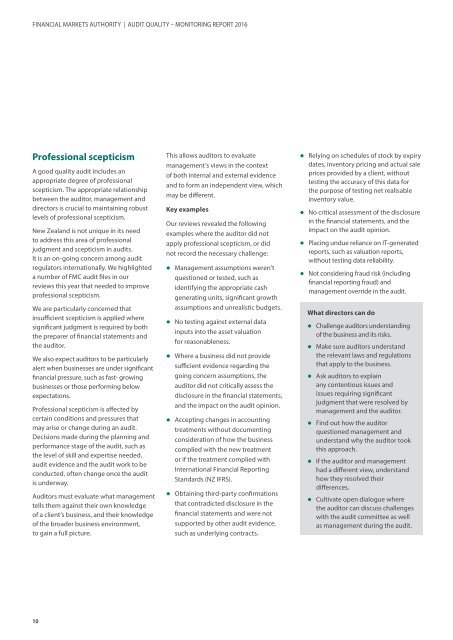Audit Quality – Monitoring Report
161128-Audit-Quality-Monitoring-report-2016
161128-Audit-Quality-Monitoring-report-2016
You also want an ePaper? Increase the reach of your titles
YUMPU automatically turns print PDFs into web optimized ePapers that Google loves.
FINANCIAL MARKETS AUTHORITY | AUDIT QUALITY <strong>–</strong> MONITORING REPORT 2016<br />
Professional scepticism<br />
A good quality audit includes an<br />
appropriate degree of professional<br />
scepticism. The appropriate relationship<br />
between the auditor, management and<br />
directors is crucial to maintaining robust<br />
levels of professional scepticism.<br />
New Zealand is not unique in its need<br />
to address this area of professional<br />
judgment and scepticism in audits.<br />
It is an on-going concern among audit<br />
regulators internationally. We highlighted<br />
a number of FMC audit files in our<br />
reviews this year that needed to improve<br />
professional scepticism.<br />
We are particularly concerned that<br />
insufficient scepticism is applied where<br />
significant judgment is required by both<br />
the preparer of financial statements and<br />
the auditor.<br />
We also expect auditors to be particularly<br />
alert when businesses are under significant<br />
financial pressure, such as fast- growing<br />
businesses or those performing below<br />
expectations.<br />
Professional scepticism is affected by<br />
certain conditions and pressures that<br />
may arise or change during an audit.<br />
Decisions made during the planning and<br />
performance stage of the audit, such as<br />
the level of skill and expertise needed,<br />
audit evidence and the audit work to be<br />
conducted, often change once the audit<br />
is underway.<br />
<strong>Audit</strong>ors must evaluate what management<br />
tells them against their own knowledge<br />
of a client’s business, and their knowledge<br />
of the broader business environment,<br />
to gain a full picture.<br />
This allows auditors to evaluate<br />
management’s views in the context<br />
of both internal and external evidence<br />
and to form an independent view, which<br />
may be different.<br />
Key examples<br />
Our reviews revealed the following<br />
examples where the auditor did not<br />
apply professional scepticism, or did<br />
not record the necessary challenge:<br />
• Management assumptions weren’t<br />
questioned or tested, such as<br />
identifying the appropriate cash<br />
generating units, significant growth<br />
assumptions and unrealistic budgets.<br />
• No testing against external data<br />
inputs into the asset valuation<br />
for reasonableness.<br />
• Where a business did not provide<br />
sufficient evidence regarding the<br />
going concern assumptions, the<br />
auditor did not critically assess the<br />
disclosure in the financial statements,<br />
and the impact on the audit opinion.<br />
• Accepting changes in accounting<br />
treatments without documenting<br />
consideration of how the business<br />
complied with the new treatment<br />
or if the treatment complied with<br />
International Financial <strong>Report</strong>ing<br />
Standards (NZ IFRS).<br />
• Obtaining third-party confirmations<br />
that contradicted disclosure in the<br />
financial statements and were not<br />
supported by other audit evidence,<br />
such as underlying contracts.<br />
• Relying on schedules of stock by expiry<br />
dates, inventory pricing and actual sale<br />
prices provided by a client, without<br />
testing the accuracy of this data for<br />
the purpose of testing net realisable<br />
inventory value.<br />
• No critical assessment of the disclosure<br />
in the financial statements, and the<br />
impact on the audit opinion.<br />
• Placing undue reliance on IT-generated<br />
reports, such as valuation reports,<br />
without testing data reliability.<br />
• Not considering fraud risk (including<br />
financial reporting fraud) and<br />
management override in the audit.<br />
What directors can do<br />
• Challenge auditors understanding<br />
of the business and its risks.<br />
• Make sure auditors understand<br />
the relevant laws and regulations<br />
that apply to the business.<br />
• Ask auditors to explain<br />
any contentious issues and<br />
issues requiring significant<br />
judgment that were resolved by<br />
management and the auditor.<br />
• Find out how the auditor<br />
questioned management and<br />
understand why the auditor took<br />
this approach.<br />
• If the auditor and management<br />
had a different view, understand<br />
how they resolved their<br />
differences.<br />
• Cultivate open dialogue where<br />
the auditor can discuss challenges<br />
with the audit committee as well<br />
as management during the audit.<br />
10


